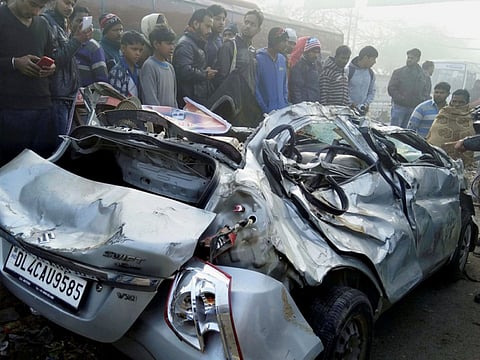400 deaths a day prompt new road law in India
In India, more than 150,000 people are killed each year in traffic accidents

New Delhi: In India, more than 150,000 people are killed each year in traffic accidents. That’s about 400 fatalities a day and far higher than in developed auto markets such as the US, which in 2016 logged about 40,000.
Now, Prime Minister Narendra Modi’s government is attempting to curb the carnage on Indian roads caused by everything from speeding two-wheelers to cars not equipped with air bags. A bill introduced in August 2016 — proposing harsher penalties for traffic offences and requiring that automakers add safety features — has passed the lower house of parliament and is expected to go through the upper house in 2018.
The wide-ranging changes are likely to boost manufacturing costs for domestic and foreign carmakers in India. The Southern Asian country will be the world’s third-largest car market after China and the US by 2020, according to researcher IHS Automotive. The World Health Organisation estimates that traffic crashes cost most countries about 3 per cent of their gross domestic product (GDP).
The UK-based non-profit Global NCAP, which studies the quality of vehicles, has over the years assigned a zero star rating to many small vehicles sold in India — an assessment that there could be life-threatening injuries in a crash at 64km/h. Past efforts in India to boost road safety haven’t taken off, and the success of this one will depend on how strictly it is implemented.
No time period
India “has delayed 20 years in making safety features mandatory”, said Dinesh Mohan, a professor at Noida-based Shiv Nadar University. Globally, manufacturers haven’t usually added such safety elements “until and unless they were forced to do so by mandatory government regulations”, he said.
A spokeswoman at India’s Ministry of Road Transport and Highways declined to give a timing for the new law.
Indian consumers are famously price sensitive when it comes to car purchases. Low-cost and no-frills compact cars have long been sold by companies such as Tata Motors, Maruti Suzuki India, a unit of Japan’s Suzuki Motor Corp., Renault and Hyundai.
These budget vehicles are usually priced below Rs400,000 (Dh23,023), and the new law is likely to require that their manufacturers add a string of features such as airbags and anti-lock braking systems.
Costs for Indian automakers will shoot up by 7 or 8 per cent after the passage of the new law and will be felt across the small car segment, said Deepesh Rathore, London-based director at consultancy Emerging Markets Automotive Advisers.
Manufacturers sometimes offer “all safety features for the models that are sold in the international markets where they have to satisfy mandatory safety standards, while they offer minimum features for Indian models,” said Mohan.
C.V. Raman, head of research and development at Maruti Suzuki, said carmakers are investing in facilities, testing and equipment to build advanced safety features into vehicles, ahead of the deadlines set by the government. For each model, Maruti has test crashed 35 to 40 cars to ensure they meet new standards, he said.
Some companies such as Toyota and Volkswagen haven’t made a distinction between their Indian and export versions, and have already exceeded Indian safety norms. Rajan Wadhera, president at the automotive sector of India’s Mahindra & Mahindra, said his company offers the same safety features on both domestic and export models.
The bill is expected to require the additional safety features on cars to be manufactured from July 1. Indian road ministry data show that 83 per cent of road accident fatalities were in the age group of 18 to 60 years, or mostly the working age population.
— Washington Post
Sign up for the Daily Briefing
Get the latest news and updates straight to your inbox



